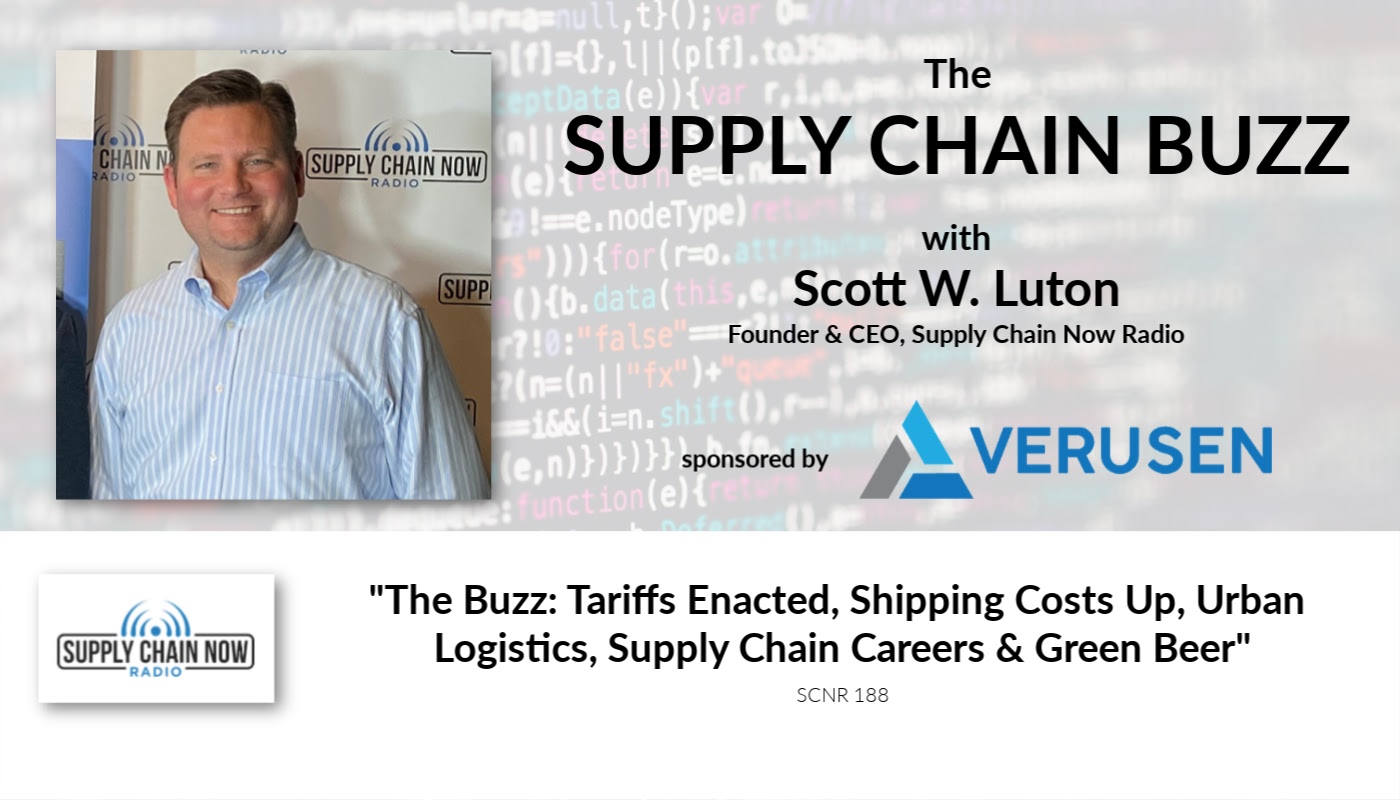Supply Chain Now Radio Episode 188

Supply Chain Now Radio, Episode 188
The Supply Chain Buzz Series
Sponsored by Verusen: www.verusen.com/

In this episode of the Supply Chain Buzz, Scott Luton discusses the latest topics in supply chain- tariffs, increased shipping costs, urban logistics, supply chain careers, and green beer.
[00:00:08] Hey, good morning Scott Luton here with you lob on Supply Chain Now Radio. Welcome to the show. In today’s show, we are continuing our Supply chain Buzz series, a brief weekly look at some of the top news and trends across the global India in Supply chain community.
[00:00:26] All in 50 minutes or less. Today’s episode of The Supply chain Buzz. Supply Chain Now Radio is brought to you by Verusen, an innovator in materials, inventory and data management technology.
[00:00:40] Berenson’s cloud platform uses artificial intelligence to harmonize and provide visibility into materials, inventory data from ERP and other systems. You can learn more at Verusen dot com v e r u s e in dot com. It’s Monday, October 21st. And let’s get to the news. First up. As reported by Morgan, Ford and Mark Cosgrove over at Supply chain Dove, 7.5 billion worth of tariffs were Lévy by the United States last Friday morning. The items impacted include aircraft parts, luxury apparel, cheese, seafood, steel inputs, import, rather, from France, Germany, Spain and the United Kingdom will be impacted the most. The tariffs were implemented hours after the World Trade Organization issued a decision authorizing the U.S. to levy tariffs of up to 100 percent on the goods. The action stems from about 15 years of U.S. led litigation at the WTO, where back in 2005, the U.S. first made its claim that low interest rates granted to Airbus were tantamount to subsidies for the aircraft manufacturer. In an interesting aside, the EU has made a similar claim about the U.S. support for Boeing. The WTO decision on that related case will be made and released at an unknown future date. Our second story, too, comes us via Ian Pritzker at the Lodestar. It deals with U.P.S. and FedEx shipping rate increases. So both companies announced that they would not levy a residential delivery surcharge during the peak season. However, they are both also making up for that in other places. For example, the peak season charges cover a longer time frame this year. For some shippers, U.P.S. is peak surcharge began on October 1st and remains in place until January 4th, 2020. Now, just last year, U.P.S. is peak surcharge timeframe was far shorter 18. We ran from November 18th to December 22nd. So peak season was five weeks in 2018 and it is now 14 weeks in 2019.
[00:03:08] In contrast, while FedEx defined a shorter window for peak surcharges, they did raise some of the associated prices. For example, extra handling will cost an additional $4 and 10 cents per package in oversized shipments will trigger an additional thirty seven dollars and fifty cents per package beyond the peak period changes. Twenty twenty pricing is ramping up as well. FedEx is raising its average rates for express shipments by 4.9 percent. This increase also will apply to FedEx Ground and Home Delivery Services. Lodestar quotes John Haber founder and CEO of Spend Management Experts as saying, quote, The market is not happy on the surcharge side. The increases are more substantial. And quote, Haber also mentions that the surcharge for packages sent to more rural locations would go up 28 percent in twenty twenty twenty eight percent. Well, on a sad note, John Haber with Spend Management Experts also sat down with Supply Chain Now Radio recently to discuss many of the parcel rate increases and offer his insights and suggestions. You can look for that link in the show notes of this episode in our third story. We learn more about a topic that we’ve covered quite a bit here at Supply Chain Now Radio. E-commerce is driving the need for smaller and more urban warehouses. Jennifer Smith with The Wall Street Journal filed a recent report citing that rent for warehouses, those between 70000 square feet and 120000 square feet. Those rent averages are up, up more than 33 percent in the last five years.
[00:04:52] All the while, availability is down is down more than 11 percent during that same time period. Bigger spaces over 250000 square feet have seen far less rent rate increases on average. Amazon and many other retailers have opened numerous online fulfillment centers across the United States as E e commerce. SALES, of course, continue to grow. This is one of the factors that has been behind a boom in Industrial real estate. Many of these fulfillment distribution centers are located in huge 1 million square foot plus facilities, oftentimes on the outskirts of city centers and just off interstate highways. But for flexibility, proximity and of course, always provides plenty of options. Many businesses have been implementing smaller distribution locations in urban area areas and closer to their customers. However, if you look at construction trends since 1990, there has been a far bigger emphasis on the bigger mass of projects leading to some of the inventory crunch for the smaller urban facilities. Adding to the mix is Amazon’s plan to shorten the delivery window for its prime customers from two days to one day. That’ll certainly put more pressure on a variety of market conditions. For additional insights on Industrial real estate, be sure to tune in to our Supply chain Real Estate series featuring Ward Richmond with Colliers International. You can learn more at Supply chain real estate dot com. Supply chain salary and career trends are the topics of our fourth story here on the Supply chain Buzz on Supply Chain Now Radio.
[00:06:41] The Association for Supply chain Management ASTM has recently released the key findings from its twenty nineteen Supply chain Salary and Career Survey report. The research conducted with over 1700 U.S. Supply chain professionals. Here are the key findings. First, Supply chain salaries are on the rise. The median salary for Supply chain professionals in 2018 was eighty thousand dollars, up from seventy eight thousand in twenty seventeen. Annual average raise raises are also increasing. Secondly, what about the work-life balance for those in Supply chain? Nearly all of the respondents to the survey received holiday pay. Eighty percent of respondents reported three or more weeks of paid time off. More than half are offered flexible schedules, flexible schedules, including the ability to work from home. The report cited strong job satisfaction numbers as well as better than expected job stability data as respondents were staying with their employers and many of these of the respondents were promoted. The research also shows that the gender salary gap is closing, especially for those under age 40. So comp benefits opportunities all across the global. In the end, Supply chain industry are up. You can learn more about the Association for Supply chain Management at ASTM scored. All right, so in our fifth and final story here on the Supply chain Buzz, we’re covering a neat story out of The New York Post. Dutch beer maker Carlsberg announced last week they’ve created the first paper beer bottle.
[00:08:30] That’s right, a bottle made out of paper. Well, technically, a bottle made out of sustainable word for wood fiber with a coated interior to prevent seepage. Carlsberg calls it their Greene fiber bottle, and it is part of their efforts to achieve zero carbon emissions at its breweries by 2030. Their hope is to move beyond the current prototypes and develop a next generation Greene fiber bottle. Made from 100 percent organic materials without any of the polymers that the current prototypes employ. According to the report, major other major brands that are developing greener packaging include Unilever, who recently launched a plastic bottle of free shampoo bars and bamboo toothbrushes. Olé! Is testing out refillable moisturiser containers and PepsiCo and the Coca-Cola Company are both planning to can water getting away from all the plastic bottles. The Greene fiber bottle is only the most recent sustainability win for the Carlsberg Company in 2018. The company eliminated the plastic rings that once held their six packs together. Now the company just glues the cans together and I think we can all drink that. All right. So one last note. That last story on beer came to us from one of our co-hosts here at Supply Chain Now Radio. Mr. Greg White Greg is a serial supply chain tech entrepreneur, trusted business advisor and serious beer connoisseur. Greg also recently wrote a guest blog for our friends over at Alloy, where he challenged many commonly held beliefs in Supply chain.
[00:10:21] Greg’s quoted as saying, quote, There is no last mile and supply chain, unquote, he states in the blog. So check out the article in our show, Notes to learn Greg’s reasoning behind this and much, much more. Or, of course, you can find the blog at Allaway a l l o y dot a. OK, that’s a wrap for today’s episode. Several of the leading Supply chain news stories and trends right here on the Supply chain Buzz on Supply Chain Now Radio. You’ll find links to each of the five stories on the show, notes for your convenience, including a few additional resources. And to our audience, come check us out in person. We hope to see you this coming Wednesday, October 23rd at the South Carolina Logistics Tech Talk event in Charleston. You can learn more about this event and many others on the upcoming events tab at Supply Chain Now Radio dot com. And while you’re there, be sure to check out all of our other series and podcasts as we continue our mission to bring new ideas, best practices and leadership stories from across the global. In the end, Supply chain world big thanks to today’s sponsor of the Supply chain Buzz Barazan and to our listeners on behalf of the entire Supply Chain Now Radio team. This is Scott Luton. Thank you for joining us and we wish you a very successful week. Thanks for by.
Upcoming Events & Resources Mentioned in this Episode
U.S. Imposes Tariffs: https://tinyurl.com/y6xv595d
Shipping Pricing Increases: https://tinyurl.com/y4uj24ll
John Haber of SME on SCNR: https://supplychainnowradio.com/episode-187/
Ecommerce Driving Smaller, Urban Warehouses: https://tinyurl.com/yy2uamjh
ASCM’s Supply Chain Survey: https://www.ascm.org/salary-survey/
Paper Beer Bottle: https://tinyurl.com/yxjo9287
Greg White Guest Blog on Alloy: https://tinyurl.com/yxs34lnm
Connect with Scott on LinkedIn: https://www.linkedin.com/in/scottwindonluton/
SCNR to Broadcast Live at SC Logistics 2019 Fall Tech Talk: https://tinyurl.com/y2mttrg8
eft Logistics CIO Forum in Austin, TX: https://tinyurl.com/y5po7tvw
SCNR to Broadcast Live at CSCMP Atlanta Roundtable Event: https://tinyurl.com/y43lywrd
Reverse Logistics Association Conference & Expo: https://rla.org/calendar/1
SCNR to Broadcast Live at MODEX 2020: https://www.modexshow.com/
2020 Atlanta Supply Chain Awards: https://www.atlantasupplychainawards.com/
SCNR on YouTube: https://tinyurl.com/scnr-youtube
Check Out News From Our Sponsors
The Effective Syndicate: https://www.theeffectivesyndicate.com/blog
Spend Management Experts: https://spendmanagementexperts.com/
APICS Atlanta: https://apicsatlanta.org
TalentStream: https://talentstreamstaffing.com/
Verusen: https://www.verusen.com/
Georgia Manufacturing Alliance: https://www.georgiamanufacturingalliance.com/
ProPurchaser.com: https://tinyurl.com/y6l2kh7g
Supply Chain Real Estate: https://supplychainrealestate.com/
Vector Global Logistics: http://vectorgl.com/





